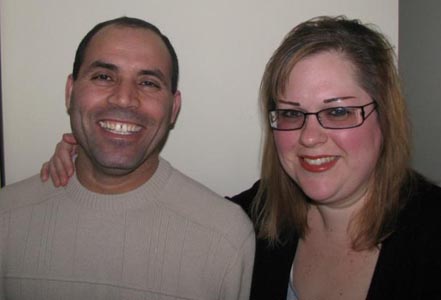Think back to December 10, 2002 — nine years ago this weekend, International Human Rights Day.
Perhaps on that day you were aware of the human rights significance, and perhaps not. But more importantly, what were you doing with your life back then? Were you in a different job? A different city? Perhaps in the interim you earned a post-secondary degree or diploma, or possibly more than one. How many job interviews did you attend in those nine years? How much money have you earned? Did you have children? Did you visit relatives in another province? Perhaps take a honeymoon? Travel abroad?
None of these things have been possible for Mohamed Harkat. This weekend — International Human Rights Day — marks the ninth anniversary of the detention of Mohamed Harkat under a security certificate — a draconian detention under the so-called Immigrant and Refugee Protection Act for which no charge is laid, and the information on which the allegation is based is kept secret from the detainee and their lawyers. The five Muslim men who have been detained since 2001 have been jailed in isolation or, at best, released under strict house arrest conditions — the strictest in Canadian history.
On Dec. 10, 2002, Mohamed Harkat was arrested and detained on a security certificate. His long battle against injustice began that day, and today it continues. He was detained, first in the Ottawa jail in solitary confinement, then in general population, and for a period of six months in an immigration detention centre — dubbed Guantanamo North — at the Kingston penitentiary. In 2007, a major victory was realized for human rights when the Supreme Court of Canada ruled the Security Certificate process unconstitutional. Unfortunately, the Harper government merely made cosmetic changes to the regime, introducing so-called “Special Advocates” who, while they are privy to the secret proceedings, are not allowed to talk to the detained after proceedings begin except in highly controlled circumstances.
In 2006, Mohamed Harkat — “Moe” to his friends and family — was released under the strictest release conditions in Canadian history. He was accompanied 24 hours a day by his wife, and was only allowed out of his home on outings of four hours, twice per week. All destinations on the outings had to be pre-approved by CBSA, and often they were not approved. Their phone calls were monitored and their mail photocopied. To give you a sense of how ridiculous the conditions were, Moe could not go into the house for a forgotten bottle of ketchup during a family barbecue without his wife Sophie accompanying him. To give you a sense of how draconian they were, when Mohamed Mahjoub, another detainee with similar conditions, took his wife to hospital, CBSA agents followed him into his wife’s room while she was having a miscarriage.
Mohamed Harkat and his wife Sophie were quite optimistic that second certificate, issued after the new legislation was passed in 2008, would be quashed. They felt that the public case was clearly not strong enough to convince the judge that the government’s claims were reasonable, and they hoped the special advocates would ensure that claims made in the secret information would be challenged. But the certificate was upheld, and to this day Moe has no idea why, because the secret information has remained secret. Human rights defenders familiar with the situation rightly believe basic human rights such as the right to know the case against you are being abrogated.
While two Security Certificates — those on Hassan Almrei and on Adil Charkaoui — have been defeated or quashed, three men — Moe, Mr. Mahjoub, and Mahmoud Jaballah — still live in limbo. They cannot live full lives, and nor can their families. The stigma that prevents them from working or leading normal lives in Canada is the same stigma that, should they be deported or leave voluntarily for their country of origin, would put their lives in danger and place them at risk of torture.
Revelations this week that Jim Judd, former director of CSIS, expressed concerns that banning information gleaned from torture would weaken security certificate cases, could not be more timely. For an agency whose leader could so cavalierly suggest that it needed to rely on evidence, not gleaned from torture, but gleaned from information gleaned from torture (as if that would be okay), this is only the most recent in a series of blows that reveal how paranoid the secret intelligence agency has become.
It is time for the security certificate regime to end. Mohamed Harkat wants his life back. Rally in Ottawa on December 10 or sign the Statement Against Security Certificates. Make a donation: Justice for Mohamed Harkat Committee, 14 Perkins St., Ottawa, ON., K1R 7G5
Dear rabble.ca reader… Can you support rabble.ca by matching your mainstream media costs? Will you donate a month’s charges for newspaper subscription, cable, satellite, mobile or Internet costs to our independent media site?



